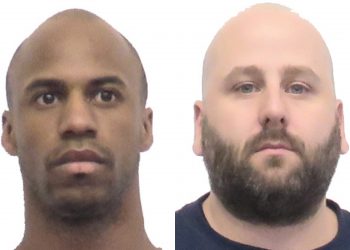DES MOINES, Iowa – The Iowa House of Representatives passed two major gun bills on Wednesday. One bill, HF 621, restricts liability in product liability cases involving firearm or ammunition manufacturers, distributors, or dealers. The second bill, HF 756, is a firearm omnibus bill with several provisions, including allowing the permitless carrying of firearms.
The Iowa House passed both bills with a mainly party-line 60 to 37 majority vote. State Rep. Timi Brown-Powers, D-Waterloo, joined House Republicans to pass HF 621, and State Rep. Wes Breckenridge, D-Newton, joined House Republicans voting for HF 756.
HF 621, in its statement of policy, reads, “The manufacture, distribution, or sale of firearms and ammunition by manufacturers, distributors, or dealers duly licensed by the appropriate federal and state authorities is a lawful activity and is not unreasonably dangerous, and the unlawful use of firearms and ammunition, rather than their lawful manufacture, distribution, or sale, is the proximate cause of injuries arising from their unlawful use.”
The bill states that a judge must dismiss a case and award “reasonable” attorney fees and costs if it is found that a plaintiff bringing a lawsuit is basing that action’s “theory of recovery” on the lawful design, manufacturer, marketing, or sale of a firearm or ammunition. Lawsuits against gun or ammunition manufacturers, distributors, or dealers can not be based on injuries caused by the unlawful use of a firearm or ammunition.
The legislation covers all firearm or ammunition manufacturers, importers, distributors, trade associations, sellers, or dealers.
Lawsuits based on the breach of contract or warranty, damage or harm caused by a defective firearm or ammunition, and injunctive relief to enforce a valid statute, rule, or ordinance are allowed under the bill.
“Backdoor attempts to destroy the Second Amendment by putting gun and ammunition manufacturers out of business through endless and costly lawsuits could make the Second Amendment a right that exists only on paper. This legislation would not allow that to happen in Iowa,” State Rep. Steve Holt, R-Denison, the manager of both bills, said in his opening comments during the almost 40 minutes of floor debate for the bill.
Iowa House Democrats attempted to offer three amendments to the bill, and all lost during a record vote.
State Rep. Sharon Steckman, D-Mason City, opposed the bill, “This bill takes away the rights of lawful gun carrying Iowans to be heard in court.”
State Rep. Bruce Hunter, D-Des Moines, also spoke to oppose the bill.
“Civil liability can be used as an important check on irresponsible manufacturers and sellers, but not the gun industry. With the passage of House File 621. Republicans will make the gun industry immune from nearly all lawsuits, leaving families of gun violence victims without an avenue to seek justice,” he said.
Holt, in his closing comments, said he wished the bill was unnecessary.
“I think it is truly unfortunate that this legislation is necessary, but in 2021 it is absolutely necessary. Backdoor assaults on the Second Amendment seek to hold gun and ammunition manufacturers and distributors responsible for the illegal use of that which they produce,” he said, noting that no other product has liability like that.
“Many citizens, cities, and victims of gun crimes were pressured by gun control groups to go after the firearms industry by filing frivolous lawsuits. Andrew Cuomo encouraged this tactic as a way to bring about “death by one thousand cuts” to the firearms industry. So there are folks on record seeing this as an opportunity to destroy the firearms industry. And when the firearms industry is destroyed. The second amendment is, in effect, a right on paper only,” Holt added.
Listen to the entire debate:
The Iowa House held a marathon debate over House File 756, lasting almost four hours. The firearms omnibus bill has several provisions.
Along with permitless carry, HF 756 also allows EMTs assigned to a law enforcement tactical team to have a professional permit to carry. It will enable active and reserve law enforcement officers to carry on school grounds whether they are on or off duty. The bill expands handgun safety training. It also strengthens preemption laws to prevent municipalities from further regulating the carrying of firearms beyond what state law allows. The legislation also prevents landlords and government-assisted housing from banning firearms.
Holt offered an amendment that was approved that, along with other provisions requested by law enforcement, increased the penalty when private sellers of firearms sell to people “they know or should reasonably know” are disqualified under state or federal law from owning and carrying a weapon. Those who do that can be charged with a Class D felony which, if convicted, could carry a sentence of up to five years in prison and a fine of up to $7500. Also, those convicted would be disqualified from owning a firearm.
Those who still obtain permits to carry or purchase a firearm undergo a background check. Anyone without a permit who purchases a firearm from a federally licensed dealer will submit to a background check every time they purchase a firearm.
During his opening remarks on HF 756, Holt explained that the increased penalties for those who sell to someone disqualified from owning a firearm would have a cooling effect on private sales.
“You better know who you’re selling to, or you could be committing a Class D felony and lose your right to own a firearm forever,” he said.
Holt later said he spoke with several gun owners who said they would go to a federally licensed dealer and sell their firearms on consignment rather than risk violating the law.
He said his amendment adds further restrictions.
“The right to carry is invalidated for persons under the influence of alcohol. The right to carry is invalidated for persons under the influence of drugs. The right to carry is invalidated for persons in possession of illegal drugs. The right to carry is invalidated for those persons in the commission of an indictable offense. We are adding to state law those prohibitions against being allowed to possess a firearm that exists in federal law,” Holt said.
Democrats filed numerous amendments to extend debate over the bill and Holt’s amendment, all of which failed.
Most Democrats balked at the idea of no background checks for private sales. State Reps. Christina Bohannan, D-Iowa City, and Mary Wolfle, D-Clinton, argued that there were potential loopholes in the “know or reasonably should know” language in the bill regarding a sellers’ responsibility during private sales of firearms. Wolfe, an attorney, said it would be easy to defend someone who sells a firearm to a stranger.
State Rep. Beth Wessel-Kroeschell, D-Ames, provided a scenario of a felon purchasing a gun from someone he found online who didn’t know or would reasonably know that the person buying it was a felon.
“He begins to carry his gun. He still hasn’t had a background check because there’s no permit to carry. ‘Don’ is a convicted felon. He bought a gun without a background check. He’s a convicted felon, and he’s carrying without a background check. Under this bill, ‘Don,’ a convicted felon, has a clear path to purchase and carry a firearm with no background check, which would have disqualified him under current law,” she said.
State Rep. Mary Mascher, D-Iowa City, opposed the bill as well.
“Background checks on all gun purchases can and will keep the public safe. Representative Holt, I wish that’s what you were proposing tonight. When background checks are required and properly enforced, they can keep guns out of dangerous hands,” she said.
State Rep. Monica Kurth, D-Davenport, said Iowans deserve to feel safe.
“All Iowans deserve to have a feeling of safety in their world. Background checks and permits are at least one way to increase that feeling of security. Requiring background checks on all gun sales is proven to reduce gun violence,” she said.
Iowa House Majority Leader Matt Windschitl, R-Missouri Valley, spoke in defense of the bill stating the bill does not eliminate background checks.
“We’re not trying to make Iowa less safe. We’re not trying to eliminate background checks. What we’re doing with this piece of legislation is advancing Iowans’ freedoms. We talk a lot about the inanimate object, the gun; let’s move a step beyond that inanimate object. Well, we are truly talking about our basic human rights, our right to self-preservation, and that is encompassed within the Second Amendment,” he said.
Windschitl said he and other Republicans hear from constituents who support the bill and appreciate their work to protect their constitutional rights.
“In the 15 years, I’ve been in this body that I’ve been honored by my constituents to serve, being so passionate about Second Amendment virtues, guess who’s got a lifeline out to that Second Amendment community in Iowa? I do,” he said. “And I’m not just talking to somebody that is high up in an organization or somebody that’s got an important title. I’m talking about the people that don’t live in my district, and will probably never have the opportunity to vote for me that live in some of your districts in eastern Iowa, Northeastern Iowa, northwest Iowa, all over the state that they call me, and ask me, what are we going to do? How are we going to protect our rights? How are we going to advance our freedoms?”
“Those are my people. Those are House Republicans’ people. That’s who we’re speaking for here tonight. Those same people that saw fit to give us a 59 seat majority. (The) same people whose basic human rights we are trying to respect and uphold with the advancement of this legislation. I have faith in Iowans. I’ve been fighting for this bill ever since I got down here,” Windschitl argued.
Bohannan spoke again and argued no constitutional right is absolute and directed her comments to Windschitl.
“I support the Second Amendment. So what you’re saying is the right is absolute. There are no conditions. There are no restrictions. There’s no constitutional right like that. There just isn’t, and I’m not picking on the second amendment here. There’s just no constitutional right like that,” she said.
State Rep. Rick Olson, D-Des Moines, complained that there wasn’t an ID requirement in the bill.
“Why does this bill not require a citizen who’s exercising his Second Amendment rights to produce any type of identification? Why does it not? That is a flaw in this bill. That is a flaw that’s going to affect the police. And I’m telling you this bill does not back the blue it screws the blue,” he said.
Holt, in his closing comments, responded to criticism of the language directed at private sellers. He said he trusts Iowans’ common-sense more than they do.
“You won’t find one line in this legislation that says it eliminates background checks because it doesn’t. The only thing you can conclude in saying that is related to the private sales because now we’re saying you’re committing a Class D felony if you sold to somebody that you knew you shouldn’t have sold to. And right now, we say you have to have a permit. But there’s nothing in the law that says anybody has to look at that permit. There’s nothing in the law that that is enforceable in that regard,” he argued.
Holt said the Democrats were attempting to establish a narrative.
“Saying something over and over again doesn’t make it true. And I actually think we’re tightening the loophole. If you want to call it a loophole on private sales, what I call it is we’re respecting the privacy of citizens in private sales. That’s why the federal government doesn’t have a requirement for a background check. You know, we can always legislate to the lowest common denominator. And when we do that, because we’re thinking of every possible crazy scenario from criminals, and when we do that, folks, we have no freedom left in the United States of America, none. If we’re going to legislate in that way, we have no freedom left,” he stated.
Listen to the entire debate on HF 756.















